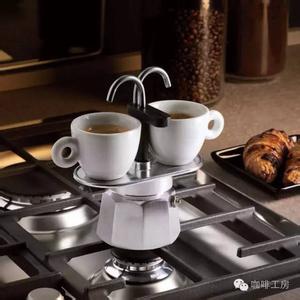El Salvador Himalayan Coffee Manor with sour, bitter and sweet taste
El Salvador's domestic topography is mainly mountainous, plateau, volcanic, known as the "country of volcanoes", Santa Ana active volcano 2385 meters above sea level, for the country's highest peak; the north of the country for the Lompa River Valley, the south for the narrow coastal plain El Salvador has a tropical climate, the annual average temperature is 28 ℃; November-April is the dry season, May-October is the rainy season; the coastal and lowland climate is hot and humid, the mountain climate is cool. The annual precipitation in the mountains is more than 1800 mm, and the coastal zone is about 1000 mm. The Salvadoran flag was opened in 1822, was withdrawn in 1865, was restored in 1912, and was restored in 1972.
The Constitution of # was officially established as the national flag. The national flag is rectangular, with a ratio of length to width of 335 to 189. From top to bottom, the flag is connected by three parallel equal horizontal rectangles of blue, white and blue, and the central part of the white part is painted with the national emblem. Because El Salvador used to be a member of the former Central American Federation, its national flag is the same color as the original Central American Federal Flag. Blue symbolizes the blue sky and sea, while white symbolizes peace. The Constitution of El Salvador formally entered into force on December 23, 1983. The Constitution describes the country's political system, the mode of presidential election, legislation, the exercise of judicial power, and so on. It is specifically stipulated that presidential candidates can be elected if they get more than 50% of the votes in the first round, otherwise, the judicial power of El Salvador shall be exercised by the Supreme Court, the Procurator-General, etc., in the second round of voting between the top two candidates with the largest number of votes. The Supreme Court is composed of 15 judges (including the President) and is elected by Parliament. The President of the Supreme Court shall serve for a term of five years and shall be eligible for re-election. Judges are appointed for a term of nine years, with 1/3 re-elected every three years. The Attorney General shall be elected by Parliament for a term of three years and shall be eligible for re-election. Oscar Armando Pineda Navas (Oscar Armando Pineda Navas), president of the Supreme Court, took office in August 2014. Attorney General Sonia Elizabeth Cortez de Madeleine (female, Sonia Elizabeth Cort é z de Madriz), took office in January 2010 and was re-elected in January 2013
Savanna climate. The plain area belongs to the tropical rain forest climate and the mountain area belongs to the subtropical forest climate. The average annual temperature is 25-28 ℃. The annual precipitation is more than 1800 mm in mountain areas and about 1000 mm in coastal areas. The rainy season is from May to October.
Don't underestimate El Salvador's coffee production. In its heyday, it was once the fourth largest coffee producer in the world, but decades of civil war almost dragged down the coffee industry. fortunately, the war has stopped in recent years, and the coffee industry has come back to life. The only benefit that the civil war brought to the Salvadoran country was that the farmers' fields were barren and failed to catch up with the most popular Katimo exposure train in the past two decades, thus preserving the ancient varieties of bourbon and Tibica, that is to say, El Salvador still uses the most traditional shade planting, which is of positive significance to the aroma of coffee. In 2005, the Salvadoran mixed-race variety Pacamara boasted in coe, which confused many international cup testers and did not know how to grade it. It never expected that this hybrid bean not only broke the mellow boundary of coffee, but also expanded the visibility of Salvadoran coffee from Pacamara to artificially cultivated varieties of Pacas and Maragogipe. It was first cultivated by researchers in El Salvador in 1958. Pacamara is an excellent variety under rare artificial breeding, which is better than blue, and perfectly inherits the advantages of the mother plant. Both the excellent taste of Pacas and the large size of Maragogipe are inherited by raw bean granules. The bean body is at least 70% and 80% of that of elephant beans, with more than 17 orders and more than 100% and more than 18 eyes. Average bean length 1.03 cm (general bean about 0.8-0.85 cm) average bean width 0.71 cm (general bean about 0.6-0.65), thickness 0.37 cm, bean shape plump and round. The biggest feature of this variety is that it is sour, lively and tricky, sometimes biscuit, sometimes fruity, thick and greasy. The best quality Salvadoran coffee from El Salvador and Guatemala-Salvadoran coffee flavor: balanced taste and good texture
Recommended baking method: moderate to deep, with a variety of uses
Top quality beans: El Salvador SHB
Taste characteristics: sour, bitter, sweet mild and moderate.
Salvadoran coffee ranks side by side with Mexico and Guatemala as the producers of Asa and Merdo, and is fighting for the top one or two places in China and the United States with other countries. The highlands of origin are large coffee beans of all sizes, which are fragrant and mild in taste. Like Guatemala and Costa Rica, coffee in El Salvador is graded according to altitude. The higher the altitude, the better the coffee. It is divided into three grades according to elevation: SHB (strictlyhighgrown) = highlands, HEC (highgrowncentral) = mid-highlands, and CS (centralstandard) = lowlands. The best brand is Pipil, which is what the Aztec-Mayan (Aztec-Mayan) called coffee, which has been recognized by the American Organic Certification Society (OrganicCertifiedlnstituteofAmerica).

Important Notice :
前街咖啡 FrontStreet Coffee has moved to new addredd:
FrontStreet Coffee Address: 315,Donghua East Road,GuangZhou
Tel:020 38364473
- Prev

Costa Rican Yerzaro coffee with clear flavor and bright acid taste the manor area is special.
1502 C. Columbus discovered the coast of Costa Rica on his fourth voyage. Since then, the Spanish colonists have invaded many times. The city of Catago was founded in 1563 and Costa Rica was colonized by Spain and placed under the jurisdiction of the Governor's Office of Guatemala. During the colonial period, under the cruel enslavement and oppression of the Spanish colonists, the Indians were almost wiped out and there was little labor available for enslavement.
- Next

Flavors Clear Costa Rica San Román Coffee Estate Flavors Taste Features
Of the six general elections held between 1953 and 1978, the National Liberation Party won four. During the party's administration, it emphasized state intervention in the economy, nationalized some industries, raised import taxes to protect national industries, forced the United Fruit Company to increase income taxes; strengthened relations with other Latin American countries and Western Europe, and changed its dependence on the United States. It joined the Central American Common Market in 1963 for 70 years.
Related
- Detailed explanation of Jadeite planting Land in Panamanian Jadeite Manor introduction to the grading system of Jadeite competitive bidding, Red bid, Green bid and Rose Summer
- Story of Coffee planting in Brenka region of Costa Rica Stonehenge Manor anaerobic heavy honey treatment of flavor mouth
- What's on the barrel of Blue Mountain Coffee beans?
- Can American coffee also pull flowers? How to use hot American style to pull out a good-looking pattern?
- Can you make a cold extract with coffee beans? What is the right proportion for cold-extracted coffee formula?
- Indonesian PWN Gold Mandrine Coffee Origin Features Flavor How to Chong? Mandolin coffee is American.
- A brief introduction to the flavor characteristics of Brazilian yellow bourbon coffee beans
- What is the effect of different water quality on the flavor of cold-extracted coffee? What kind of water is best for brewing coffee?
- Why do you think of Rose Summer whenever you mention Panamanian coffee?
- Introduction to the characteristics of authentic blue mountain coffee bean producing areas? What is the CIB Coffee Authority in Jamaica?

